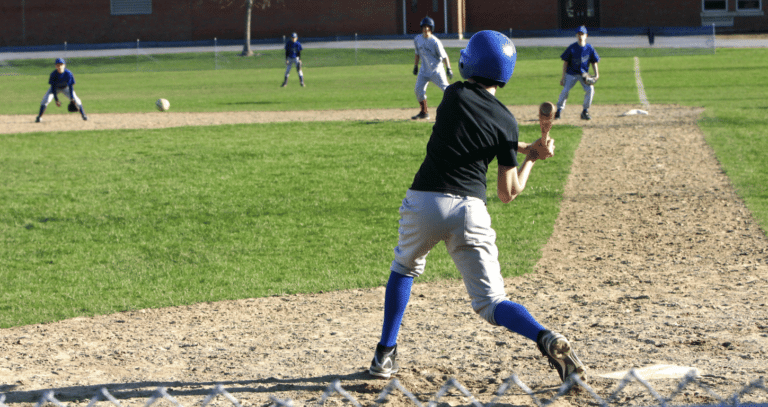20 Reasons Why Your Child Needs More Playing Time in Youth Baseball
- Erik
- October 4, 2024
- 3:16 pm

Youth baseball is more than just a game; it’s essential for the physical, emotional, and social development of young athletes. Consistent playing time is key to this growth, offering lessons that can’t be learned in practice alone.
Game time is where real progress happens—whether it’s improving skills, learning to handle pressure, or building confidence. Studies show that kids who get regular game time develop faster and form stronger connections with teammates than those who spend more time on the bench¹.
This article highlights 20 reasons why playing time is crucial for your child’s development, and how they can gain more opportunities to play.
More Field Time, More Growth: 20 Reasons Your Child Needs to Play
1. Lack of Skill Improvement
If your child isn’t improving core skills like hitting or fielding, it may be due to limited game-time exposure. According to The Journal of Youth Sports, players improve motor skills 25% faster when engaged in competitive games compared to practices¹. Game situations force athletes to apply learned skills in real-time, speeding up their development.
2. Falling Behind Peers
When a child is benched too often, they can fall behind their peers. Studies from the National Alliance for Youth Sports show that children with regular playing time develop key skills 15% faster than those who mostly practice². Missing valuable on-field opportunities leads to slower growth and reduced competitiveness.
Tip: Encourage participation in off-weekend guest playing programs to ensure your child gets more reps and stays on par with their teammates.
3. Not Building Game IQ
Game intelligence is developed by understanding strategy, decision-making, and situational awareness. Players who don’t experience enough game time often lack this understanding. According to USA Baseball, regular in-game exposure is crucial for learning these skills³.
4. Disengagement from Teammates
Not playing regularly can lead to a feeling of isolation from the rest of the team. Studies from the National Federation of State High School Associations reveal that children who actively participate in games form deeper connections with their peers, increasing team morale and inclusion⁴.
5. Loss of Confidence
When a child spends more time on the bench than on the field, their self-esteem can take a hit. Research from Project Play indicates that 60% of youth athletes experience a decline in confidence when they aren’t given sufficient playing time⁵. A lack of confidence may lead them to doubt their abilities and reduce their engagement in the sport.
6. Decreasing Enjoyment of the Game
Sitting out too often can make baseball feel like a chore instead of something fun. Michigan State University found that 70% of children quit youth sports by the age of 13 because they stop having fun⁶. Ensuring regular playing time reignites their passion for the game and helps them rediscover joy on the field.
7. Increased Frustration
Watching their teammates play while they sit on the sidelines can cause frustration in young athletes. A study in the Journal of Adolescent Sports Psychology found that players who don’t get enough game time often experience higher levels of frustration and burnout, which may lead them to quit the sport prematurely⁷.
8. Mental Fatigue
Sitting on the bench for too long can lead to mental fatigue, diminishing a player’s focus and readiness when they finally enter the game. Regular game participation keeps them mentally sharp and engaged.
Tip: Signing up for guest playing opportunities provides additional game-time that can combat mental stagnation and keep your player fresh.
9. Physical Stagnation
Game time isn’t just for improving strategy—it’s also essential for physical development. According to the American Academy of Pediatrics, repetitive physical engagement in games is vital for muscle memory, reaction time, and overall physical fitness⁸.
10. Plateauing Performance
Without frequent on-field challenges, young athletes can hit performance plateaus. Competitive gameplay pushes children to improve, but without it, they may struggle to break through stagnant phases.
11. Not Developing Critical Leadership Skills
Leadership grows from experience on the field. Children who are regularly involved in games are more likely to develop decision-making and leadership skills, which are critical for long-term success in sports. Research from the Youth Sports Trust emphasizes that leadership abilities directly correlate with consistent playing time⁹.
12. Declining Motivation
When players sit on the sidelines too often, their motivation to improve or engage with the sport may diminish. It becomes a self-perpetuating cycle: less playing time leads to lower motivation, which in turn leads to less playing time.
13. Difficulty Managing Pressure
Children who don’t experience enough game pressure may struggle to develop resilience. A study from The Journal of Sports Psychology shows that regularly facing high-stakes situations builds mental toughness¹⁰. Without exposure to game-time pressure, young players may falter when faced with similar conditions in the future.
14. Feeling Left Out of Celebrations
Being part of a team is more than just playing games—it’s about sharing in the victories and moments of celebration. Players who spend too much time on the bench miss out on those experiences, which can diminish their sense of belonging.
15. Reduced Opportunities for Social Growth
Youth sports offer children the chance to meet new friends and build lasting relationships. Players who don’t get enough playing time often miss out on team bonding and socialization opportunities that can only happen on the field.
16. Not Playing with Friends
If your child’s friends are getting more game time, it can cause feelings of isolation. Playing alongside friends is one of the biggest motivators for young athletes. Programs that offer guest playing opportunities can reunite players with their friends, while also expanding their social circle.
17. Not Reaching Full Potential
Children who aren’t given enough playing time are often held back from reaching their full athletic potential. They miss the game-time challenges needed to stretch their abilities. Youth sports experts suggest that balancing practice and game-time opportunities is critical for players to unlock their potential.
18. Limited Opportunities to Compete
Without regular competition, players can’t hone their skills. A study by the National Youth Sports Coaches Association found that children who play more games exhibit faster skill acquisition and a deeper understanding of game mechanics¹¹.
Tip: Look for additional playing opportunities in competitive guest playing programs to keep your child’s skill development on track.
19. Not Enough Reps at Key Positions
Children who specialize in certain positions (e.g., pitcher, shortstop) need consistent playing time in those roles to develop. Inconsistent game time, particularly at key positions, can severely hinder development. USA Baseball emphasizes the importance of regular position-specific reps for young players³.
20. Struggling to Maintain Game Focus
Children who spend too much time on the bench may lose focus during the game. Consistent play keeps them alert and engaged, while prolonged periods on the sidelines can make them distracted or disengaged.
Conclusion
Youth baseball is about more than just winning games—it’s about building skills, confidence, friendships, and character. By ensuring your child gets more playing time, whether through their regular team or guest playing opportunities, you help them grow in every aspect of the sport. Don’t let limited playing time hold your child back; ensure they have the opportunities they need to succeed.
Sources:
¹ The Journal of Youth Sports, 2019 Study on Skill Development.
² National Alliance for Youth Sports, Skill Progression Research, 2021. Retrieved from NAYS.
³ USA Baseball, Study on Youth Player Development. Retrieved from USA Baseball.
⁴ National Federation of State High School Associations, “Inclusion and Team Dynamics in Youth Sports.” Retrieved from NFHS.
⁵ Project Play, 2020 Survey on Youth Sports Engagement. Retrieved from Project Play.
⁶ Michigan State University, 2019 Youth Sports Report. Retrieved from Michigan State.
⁷ Journal of Adolescent Sports Psychology, Research on Youth Athlete Burnout.
⁸ American Academy of Pediatrics, Youth Sports Physical Activity Report, 2021. Retrieved from AAP.
⁹ Youth Sports Trust, 2018 Report on Leadership in Sports.
¹⁰ Journal of Sports Psychology, Research on Pressure and Mental Toughness in Youth Athletes.
¹¹ National Youth Sports Coaches Association, Research on Game IQ and Competition, 2020. Retrieved from NYSCA.
Similar Blogs Posts



Copyright © 2024. All rights reserved.




